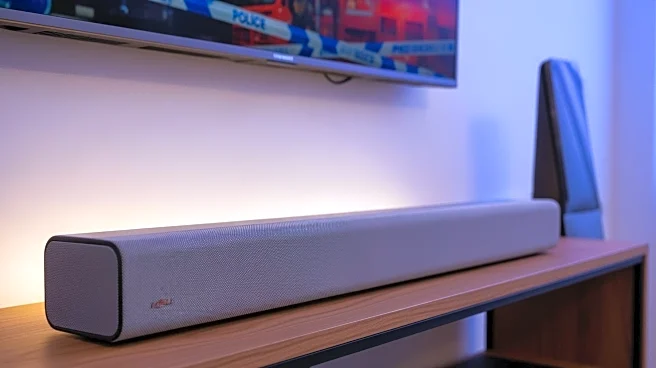What's Happening?
Amazon has significantly reduced the price of its Fire TV soundbar, now available for $99, down from its usual $119.99. This soundbar offers a 2.0-channel system with dual speakers, providing richer sound,
clearer dialogue, and substantial bass compared to standard TV speakers. It features DTS Virtual:X technology for a surround-sound experience without additional speakers, and Dolby Audio for crisp sound quality. The soundbar pairs easily with TVs via HDMI eARC/ARC ports and can also function as a Bluetooth speaker for streaming music. Its compact design, measuring 24 inches in width and 2.5 inches in height, allows it to fit seamlessly into most home setups. Additionally, the soundbar is made from 18% recycled materials, appealing to environmentally conscious consumers.
Why It's Important?
The price reduction of Amazon's Fire TV soundbar makes high-quality audio more accessible to consumers, enhancing home entertainment experiences without significant investment. The soundbar's eco-friendly design aligns with growing consumer demand for sustainable products, reflecting broader industry trends towards environmental responsibility. As consumers seek affordable and versatile audio solutions, the Fire TV soundbar's ability to function as both a TV and Bluetooth speaker adds value and convenience. This move by Amazon may influence competitors to offer similar products at competitive prices, driving innovation and affordability in the home audio market.
What's Next?
Amazon's pricing strategy may prompt other companies to reevaluate their product offerings and pricing models, potentially leading to increased competition in the home audio market. As consumers continue to prioritize sustainability, manufacturers may focus on incorporating recycled materials and eco-friendly designs into their products. The demand for versatile audio solutions is likely to grow, encouraging further innovation in sound technology and integration with smart home systems.
Beyond the Headlines
The emphasis on eco-friendly design in consumer electronics highlights broader industry shifts towards sustainability and environmental responsibility. As companies respond to consumer preferences for sustainable products, the integration of recycled materials and energy-efficient technologies may become standard practice. This trend reflects a growing awareness of the environmental impact of electronic waste and the importance of responsible manufacturing practices.









